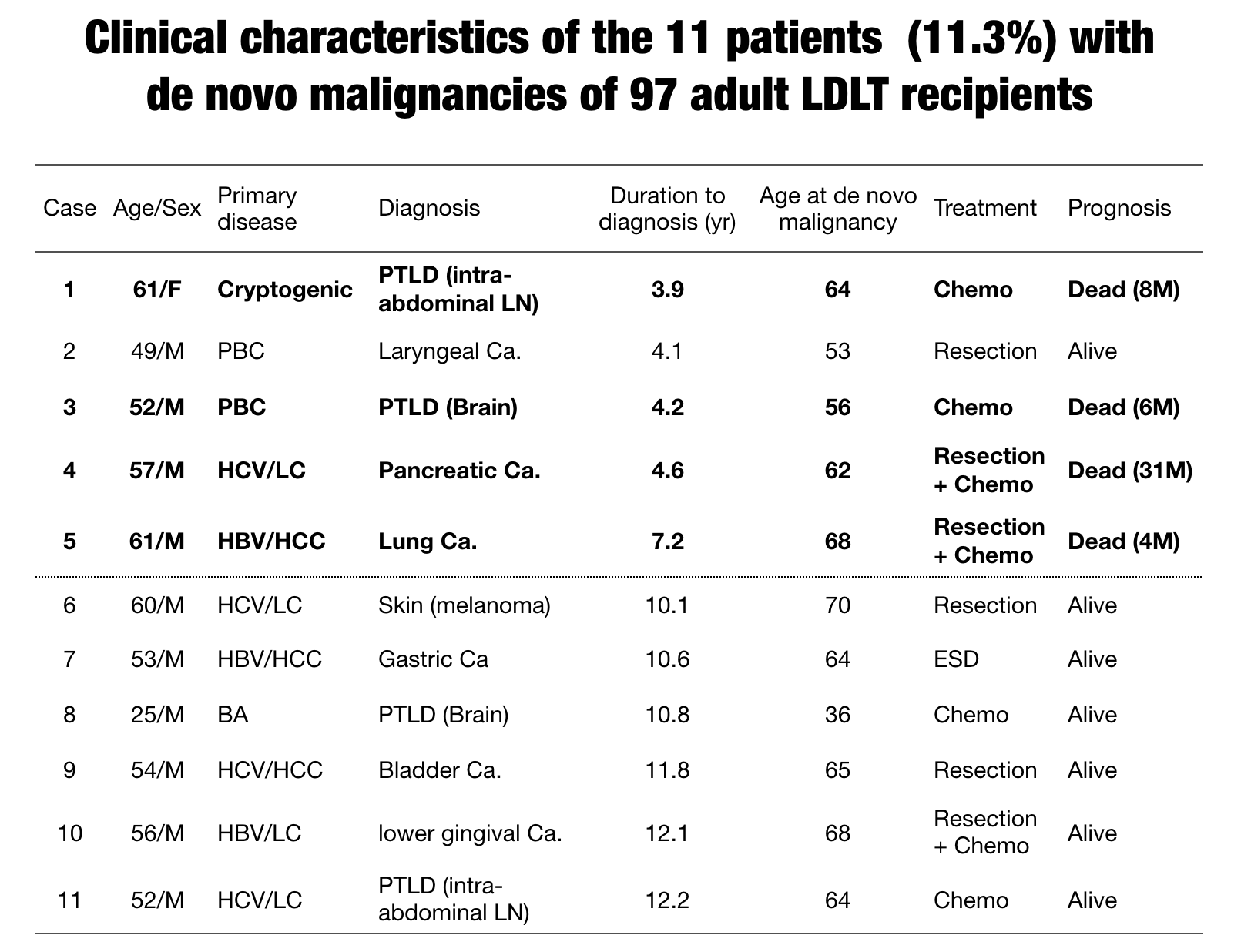Incidence of Late-Onset Complications Related to Immunosuppressive Drugs Following Adult to Adult Living Donor Liver Transplantation, Especially Focusing on De Novo Malignancy.
Hepatobiliary Pancreatic and Transplant Surgery, Mie University Graduate School of Medicine, Tsu, Japan
Meeting: 2017 American Transplant Congress
Abstract number: B230
Keywords: Liver transplantation, Lymphoproliferative disease, Malignancy
Session Information
Session Name: Poster Session B: Living Donors and Partial Grafts
Session Type: Poster Session
Date: Sunday, April 30, 2017
Session Time: 6:00pm-7:00pm
 Presentation Time: 6:00pm-7:00pm
Presentation Time: 6:00pm-7:00pm
Location: Hall D1
Objectives:
In patients with living donor liver transplantation (LDLT), late-onset complications sometimes develop and most of them are related to immunosuppressive drugs.
Patients and Methods:
In151 patients (25 children, 126 adults) with LDLT (2002.2-2016.12), we retrospectively reviewed the medical records of 97 adult LDLT patients, who had been followed-up at our hospital more than one year after LDLT. The average age of them was 52.9 years old (20-70) and the median observational period was 6.0 years (1.7-14.4). An annual checkup and screening examinations were performed as follows: abdominal computed tomography, upper gastrointestinal endoscopy, and fecal occult blood test every 1 to 2 years. Complete blood count, liver function tests, and tumor markers were checked every 1 to 3 months after LDLT.
Results:
During the follow-up period, late onset complications developed 19.1% (17/89) of chronic kidney disease, 13.4% (11/82) of new onset diabetes mellitus, 11.3% (11/97) of born fracture, 11.3% (11/97) of de novo malignancy, and 8.3% (8/97) of cerebral vascular disease, including overlapping. Forty two patients (43.3%) had never experienced late-onset complications. The diagnoses of de novo malignancies were posttransplantation lymphoproliferative disorder (PTLD) (n=4) (2 in brain and 2 in abdominal lymph nodes), lung cancer (n=1), pancreatic cancer (n=1) gastric cancer (n=1), laryngeal cancer (n=1), lower gingival cancer (n=1), bladder cancer (n=1), and melanoma (n=1). The average age at cancer diagnosis was 61 years old (36-70) and the interval from LDLT to cancer diagnosis was 8.3 years (3.9-12.2). Four patients (36.6%) died of cancer and all of them were diagnosed as cancer within 10 years after LDLT.
Conclusion:
Late-onset complication related to immunosuppressive drug developed in more than half of adult LDLT recipients. Long-term close follow-up should be performed by taking any kinds of late onset complications into consideration.
CITATION INFORMATION: Mizuno S, Iizawa Y, Kato H, Murata Y, Tanemura A, Kuriyama N, Kishiwada M, Usui M, Sakurai H, Isaji S. Incidence of Late-Onset Complications Related to Immunosuppressive Drugs Following Adult to Adult Living Donor Liver Transplantation, Especially Focusing on De Novo Malignancy. Am J Transplant. 2017;17 (suppl 3).
To cite this abstract in AMA style:
Mizuno S, Iizawa Y, Kato H, Murata Y, Tanemura A, Kuriyama N, Kishiwada M, Usui M, Sakurai H, Isaji S. Incidence of Late-Onset Complications Related to Immunosuppressive Drugs Following Adult to Adult Living Donor Liver Transplantation, Especially Focusing on De Novo Malignancy. [abstract]. Am J Transplant. 2017; 17 (suppl 3). https://atcmeetingabstracts.com/abstract/incidence-of-late-onset-complications-related-to-immunosuppressive-drugs-following-adult-to-adult-living-donor-liver-transplantation-especially-focusing-on-de-novo-malignancy/. Accessed February 16, 2026.« Back to 2017 American Transplant Congress
